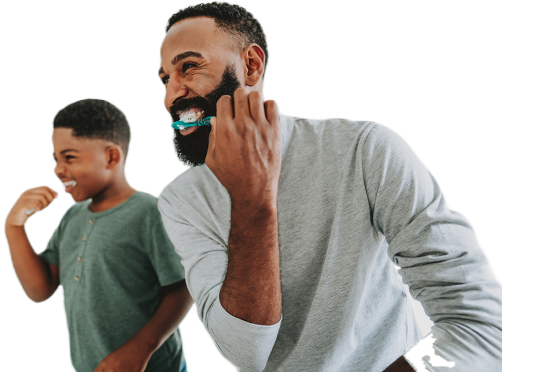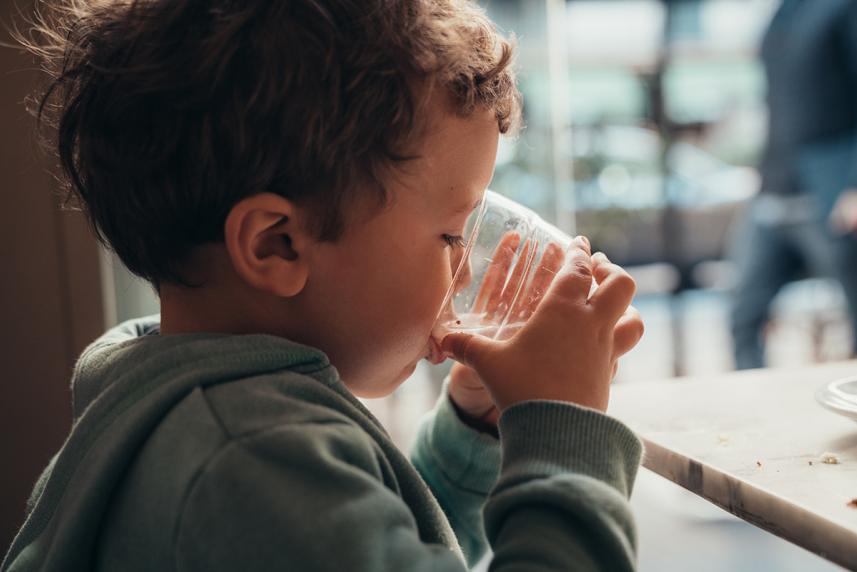
Your Premier Access plan makes it easy. No travel. No scheduling hassles. No additional cost to you! Click below to find your school and sign up.*
*You’ll be directed to MySchoolDentist to complete a permission form.
Smelly breath could be a warning sign of another problem. Here are 5 reasons your little one may have an odor — and what to do about it.

It’s normal to be blown away by your child. But if you’re blown away by the smell of their breath when you tuck them in to bed, you should talk to your dentist.
Bad breath in kids is common. In fact, more than 30% of children have it. Bad breath should always be checked out by a dentist, because it could mean there is another health problem, says Jonelle Anamelechi, D.D.S. She’s a pediatric dentist and owner of Children’s Choice Pediatric Dentistry and Orthodontics in Washington, D.C.
Here are five reasons why your child’s breath may smell, and what you can do about it.
Last night’s dinner hanging around in your child’s teeth can lead to tooth decay and bad breath. Tooth decay is the most common dental problem in children, according to the Centers for Disease Control and Prevention. It’s often caused by not brushing teeth long enough or the right way. Leftover food and germs lead to plaque buildup, which eventually causes tooth decay and cavities.
“The more germs you don’t brush off, the more they grow and the smellier the mouth gets,” says Dr. Anamelechi.
Too much plaque can also hurt your child’s gums. That’s a problem known as gingivitis. You need to take care of gingivitis or it can cause a more serious problem called periodontitis. That’s where plaque fills the space between the teeth and gums.
What you can do: Help your child brush until they are at least 7 or 8. If you’re trying to get them to be more independent, you can brush their teeth first and then let them finish the job. And don’t forget to floss either. You can also show them how to brush the right way.
Share simple tips like:
A healthy mouth needs two minutes of brushing, twice a day. Set a timer or play a song for two minutes to help your little one. You can make a reward chart and add a sticker every time they brush.

Your Premier Access plan makes it easy. No travel. No scheduling hassles. No additional cost to you! Click below to find your school and sign up.*
*You’ll be directed to MySchoolDentist to complete a permission form.
If your little one isn’t drinking enough fluids, they won’t be able to make enough saliva. Saliva helps clean their mouth and gets rid of food that causes bad breath, says Dr. Anamelechi.
What you can do: Help your child drink up. Water is best. But any fluid can help flush out food particles and germs, says Dr. Anamelechi.
Not sure how much water is best? Follow these guidelines from the American Academy of Pediatrics:
If you’re struggling to get your child to drink water, try unflavored milk instead. The calcium and protein in milk are great for building strong teeth.
Steer clear of sugary drinks, which can cause tooth decay that can also worsen breath.
Are you all too familiar with your child complaining of pain in their throat? If your child has bad breath and is prone to strep throat, then their tonsils may be to blame.
“Large tonsils are more likely to trap germs, which can cause illness and smelly breath,” says Dr. Anamelechi. Another sign of tonsil problems is snoring or trouble breathing for short periods of time during the night. This is a problem known as obstructive sleep apnea.
What you can do: Your dentist can let you know if your child has enlarged tonsils during checkups. If they are, you may want to see an ear, nose, and throat specialist. They may suggest that your child’s tonsils be removed through surgery. This is a common operation known as a tonsillectomy.
Pesky seasonal allergies may cause nasal congestion and lead children to breathe through their mouths. That can dry out their mouth and cause bad breath.
They may also have post-nasal drip, where the gunk from their nose drips down their throat. This can make your child’s breath smell, too.
What you can do: If you notice they are often congested — especially during spring, summer, and early fall — see your pediatrician to test for allergies.
Over-the-counter allergy medicines can help control symptoms. But they may also worsen your child’s breath because they dry out your mouth, notes Dr. Anamelechi.
Most steroid nasal sprays are safe for kids ages 6 and older. Talk with your doctor to see if nasal sprays are a better solution to the problem.
Does your little one like tuna? It could be causing bad breath. So can other foods with strong odors, like onions and garlic.
Brushing their teeth right after eating won’t help. That’s because the odor moves to the lungs after it’s digested. And it can cause smelly breath for up to a day.
What you can do: After a meal, you can offer your child an apple to munch on. Apples are a natural way to balance out the smells in the mouth. (Bonus: They’re also a tasty way to help keep teeth clean and cavity-free!)
Tongues can also trap leftover food. So, teaching them how to brush their tongue as part of their morning and evening routine can help, too.
Sources: